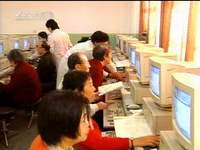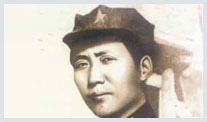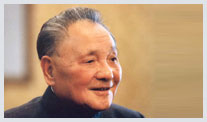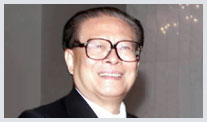|
China's elderly explore a new age 
|
| 2002-10-24 17:50:50 |
One hundred and thirty million - that's the number of people over 60 in China. To put it in perspective, that's equivalent to almost half of the population of the United States. Just a generation ago, China's senior citizens spent most of their time taking care of their extended family. Now better living conditions and smaller family units mean the elderly have the chance to explore life outside the home.
 No matter it rains or shines, at six in the morning, thousands of elderly people begin their day on schedule in some big parks in Beijing. They go through their morning routine amid the trees, fresh air and birds. But there are also other places where they come together. Elderly volunteers have formed community groups all over the city, giving senior citizens a chance to work on their dancing, shadow boxing and Peking opera repertoire.
No matter it rains or shines, at six in the morning, thousands of elderly people begin their day on schedule in some big parks in Beijing. They go through their morning routine amid the trees, fresh air and birds. But there are also other places where they come together. Elderly volunteers have formed community groups all over the city, giving senior citizens a chance to work on their dancing, shadow boxing and Peking opera repertoire.
"Spending every morning here is part of my life. I feel so happy here meeting many people around my age. I used to have some ailments but now they're all gone!" said an elder.
"I think it's so nice, I never saw this in Europe, they are happy and enjoy themselves!" said Sylvelte Coulot, a French visitor.
 You are probably surprised to see a park where so many elderly people enjoy the hours before breakfast. It's the time when most working adults are still in bed. Actually, there are thousands of parks like this in Beijing and many other cities in China. You may feel even more surprised to know that, for these elderly people, a busy and colorful day has just started.
You are probably surprised to see a park where so many elderly people enjoy the hours before breakfast. It's the time when most working adults are still in bed. Actually, there are thousands of parks like this in Beijing and many other cities in China. You may feel even more surprised to know that, for these elderly people, a busy and colorful day has just started.
In one of English classes, the average age of the students is more than 65. But the enthusiasm and commitment of these "students" defy their age. For two years, several dozen universities for the elderly have hosted weekly English classes. Mr. and Mrs. Gu are just two of the people taking advantage of the variety of courses on offer.
"We have already taken computer classes here. Nowadays, if you don't know computers, you're illiterate!" they said.
 This couple may seem to be an exception than the rule, but increasingly they represent the direction that more and more older people are heading. When the "universities for the elderly" were established in the late 1980s, traditional classes such as painting and calligraphy were the main options. But in recent years, that range of choices has expanded as the numbers and demands of older people rise. Currently, there are almost 20,000 universities for the elderly in China and they are becoming more popular each year. Researchers say the introduction of the one-child policy in the late 1970s means elderly people have more time and money to spare.
This couple may seem to be an exception than the rule, but increasingly they represent the direction that more and more older people are heading. When the "universities for the elderly" were established in the late 1980s, traditional classes such as painting and calligraphy were the main options. But in recent years, that range of choices has expanded as the numbers and demands of older people rise. Currently, there are almost 20,000 universities for the elderly in China and they are becoming more popular each year. Researchers say the introduction of the one-child policy in the late 1970s means elderly people have more time and money to spare.
"Families in China is becoming smaller. Most follow the 4+2+1 model. This means old people reply less on the family and at the same time do not have the burden of a big family like before. Their social life is more community-based," said Tang Zhenxing, director of the Chinese Assoc. for the Elderly.
Ji Xiuzhen, an elderly woman, is one regular visitor to the classes. Unlike her parents' generation, her time is not totally absorbed by family responsibilities. Instead, she takes a computer class every week with her grandson. For her and many of her classmates, the point is not so much to learn the intricacies of Word or Excel but to feel respected, fulfilled and independent.
 "My parents did not have an education. Their only responsibility was to take care of their children and grandchildren. But we have much more time and can afford extra classes," said Ji Xiuzhen, a mature-age student.
"My parents did not have an education. Their only responsibility was to take care of their children and grandchildren. But we have much more time and can afford extra classes," said Ji Xiuzhen, a mature-age student.
"My wife and I feel much relaxed with my mum taking care of my son for us. But we also want her to have her own life - learning some new skills, making new friends and being socially active," said Wang Jing, Ji Xiuzhen's son.
People over 60 now account for more than 10 percent of China's total population and that figure can be as high as 15 percent in cities. And the number of elderly people in the country is growing by about 3 percent each year.
China's senior citizens are no longer tied to the home and their role as family caretakers. Increasingly, they're stepping out into the community to make the most of the opportunities offered by their changing lifestyles.
|
|










